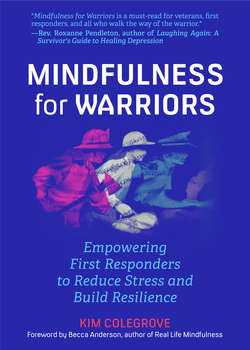Читать книгу Mindfulness For Warriors - Kim Colegrove - Страница 12
На сайте Литреса книга снята с продажи.
ОглавлениеChapter 3
Death Notification
The Saturday after Thanksgiving in 2014 was unseasonably warm in Kansas City.
My thirteen-year-old daughter and I took advantage of the nice weather and hung some Christmas lights on our front porch, then I drove her to a friend’s house for a sleepover. When I got back home, I started making dinner.
As I stirred a pot on my stove, I heard a knock. I walked toward the front door, and as I got closer, I could see a uniformed officer standing on my porch.
A feeling I cannot put into words flooded my entire system, and as I type, the feeling returns.
I opened the door, and the officer began to speak. It’s impossible to explain the shock and paralyzing emotion that engulfed me in the next few seconds. My husband had been found in his truck, in the back of our neighborhood, with a self-inflicted gunshot wound to his head. He was gone.
The next few hours, days, weeks, and months are a blurry mess in my memory. My husband chose a permanent solution to a temporary problem, and in the process created untold waves of pain and trauma.
Like everyone else who’s ever grieved, I swirled around in a vortex of sadness, anger, fear, regret, resentment, nostalgia, love, longing, confusion, and finally, acceptance (after a long, long time).
The distance, time, and space between me and that life-altering day in 2014 eventually gave rise to something new. I began to think about that incident in a new way, from a different perspective. It started with something I remembered the police officer saying in my doorway. He mentioned that an off-duty firefighter was the one who heard the shot, found my husband, and called 911. At the time, I think I had a fleeting sense of relief that it was a first responder and not a neighborhood kid who found him.
Next, my mind began to wander from person to person who might have been involved in that horrific call that day. Besides the caller, there would have been a dispatcher. What a terrible call to receive. Then, there would have been all of the others who were dispatched to the scene and had to see it, work it, keep citizens away, and participate in the cleanup. And, finally, the coroner.
It was extremely difficult for me to allow myself to picture the scene at all, let alone picturing it in such vivid detail. But there was something inside me trying to get my attention. It was nudging me toward the proper empathy and compassion for, not only the individuals who had to work the scene of a suicide that day, but all of the people who do this kind of work every day.
I realized it must have been awful for the officer who came to my house, and the detective who accompanied him and had to give me all the pertinent information in a matter-of-fact way while he watched me melting and dissolving into a puddle of grief right before his eyes.
Oh my God. My husband had done this work. Dots started connecting in my head and heart.
Prior to becoming a federal investigator, David was a police officer for eight years. He went on horrific calls and processed gruesome crime scenes. He knocked on doors and told mothers their child had died. He saw death and violence, devastation and destruction, and he witnessed things so heinous he wouldn’t speak of them.
This realization started slowly and gained momentum steadily. The more I thought about it, the more shocked I was that this had never occurred to me before. Of course, police work had contributed to my husband’s overall mental and emotional health issues. Of course, he carried invisible wounds and trauma that impacted his worldview and affected every aspect of his well-being. Of course. Of course. They all do.
All first responders have invisible wounds. They see, hear, and endure things that most of us can’t even imagine. They carry a weight that would be unbearable for the average citizen, and because of this, they are dying younger and, in some cases, choosing to end their own lives.
So, if there’s something I can do to help other first responders manage their stress and find a bit of relief from this taxing and traumatic way of life, I want to do it. I have to do it. As a tribute to my husband and a thank-you to these great people, I must do what I can to help.
